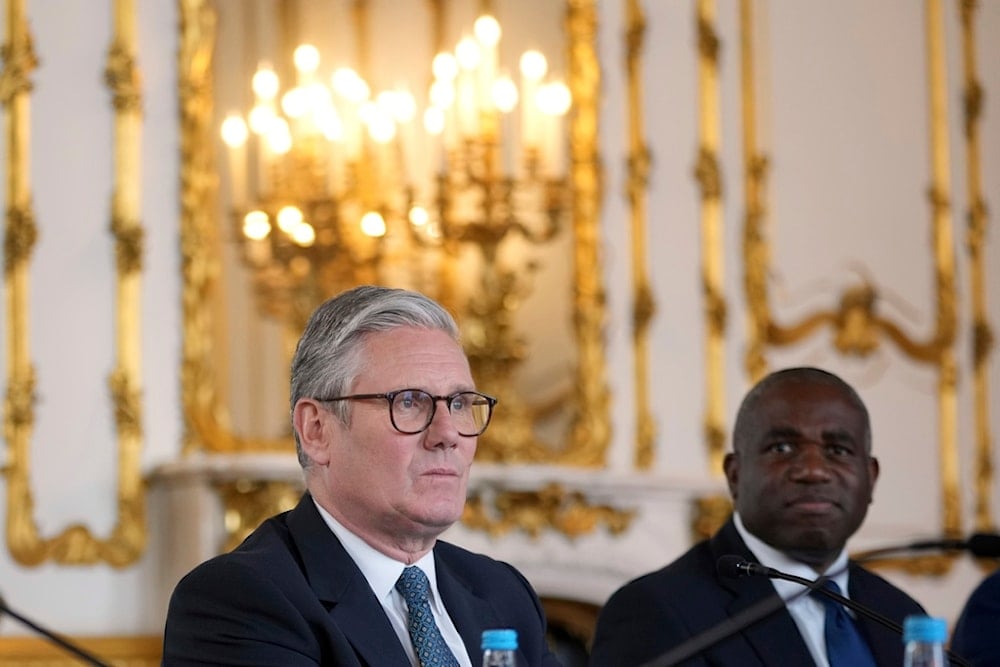Starmer, Lammy dodge questions on legality, stance on strikes on Iran
UK Foreign Secretary David Lammy refuses to confirm support for US strikes on Iran’s nuclear sites, as pressure mounts from the opposition and international critics.
-

British Prime Minister Keir Starmer and Foreign Secretary David Lammy listen during a meeting between the US and the European Union in London, Monday, May 19, 2025 (AP)
The British government is facing growing political pressure to clarify its stance on the recent US airstrikes against Iranian nuclear facilities, as Foreign Secretary David Lammy repeatedly refused to confirm whether the UK supported the action or considered it legal.
In a Monday interview for BBC Radio 4’s Today programme, his first public appearance since the strikes, Lammy sidestepped questions on the legality of the US operation, insisting it was up to Washington to address such issues. “There is still an off-ramp for the Iranians,” he said, while emphasizing the need for Tehran to return to negotiations with Western powers.
The US military launched coordinated airstrikes Saturday targeting three nuclear-related sites in Iran, claiming the move was aimed at disrupting Tehran’s nuclear program. The strikes have sparked controversy across Europe, with UK officials appearing hesitant to either endorse or criticize the attack directly.
'Very tough' talks between Iran, E3
Lammy confirmed that discussions between Iran and the E3—France, Germany, and the UK—in Geneva last week had been “very tough” but refrained from supporting US President Donald Trump’s recent social media posts suggesting support for regime change in Tehran. “This targeted action is to deal with Iran’s nuclear capability,” he told the BBC, adding that all his White House discussions focused solely on military objectives.
According to The Guardian, Lammy acknowledged Iran may still possess a stockpile of highly enriched uranium and that the airstrikes could have set the nuclear program back by “several years". However, he reiterated that the UK continues to rely on the International Atomic Energy Agency (IAEA) for accurate assessments, distancing himself from US intelligence claims that Iran is close to developing a nuclear weapon.
The UK Foreign Office also denied Iranian reports that Lammy had expressed regret over the US strikes in a call with Iranian Foreign Minister Abbas Araghchi.
Starmer of 'dodging questions'
Criticism has also emerged from opposition parties, with Liberal Democrat leader Ed Davey calling on Prime Minister Keir Starmer to address parliament directly about the UK’s role and position in the escalating war on Iran.
In a statement reported by The Telegraph, Davey warned that “Trump’s strikes on Iran were a seismic moment which will have a profound effect on global security for many years to come” and accused UK ministers of “dodging questions” on the issue.
“The Prime Minister has not even spoken once in the Commons since this crisis began,” Davey said. “He needs to come to Parliament today, update the country on where the UK stands and what he is doing to ensure the situation does not escalate any further.”
The Labour-led government has so far maintained a cautious line, with senior officials avoiding explicit criticism or support of the US action. Lammy claimed that Iran is in breach of its nuclear obligations by enriching uranium up to 60%, far beyond the 3.67% cap set by the 2015 Joint Comprehensive Plan of Action (JCPOA).
Yet, Lammy stopped short of stating whether the UK backs the US position of zero enrichment or would accept Iran enriching uranium at JCPOA levels under international monitoring. “They can have a civil nuclear capability that is properly monitored,” he said, but stressed the priority was to prevent Iran from reaching weapons-grade levels.
E3 is ready to hold more talks
For their part, France, the United Kingdom, and Germany expressed willingness to hold further talks with Iran, though they noted no concrete progress had been made.
German Foreign Minister Johann Wadepul expressed his satisfaction at holding serious talks with his Iranian counterparts, emphasizing that it's important for "the United States to participate in further discussions and in finding a solution."
French Foreign Minister Jean-Noël Barrot, in turn, emphasized that such a diplomatic initiative should open the path to negotiations with Iran, adding that the Iranian FM Araghchi is ready to resume nuclear negotiations, among other issues.
Meanwhile, British Foreign Secretary David Lammy encouraged Iran to keep engaging in talks with the US.
Kaja Kallas, the EU’s foreign policy chief, stated that both sides agreed to maintain talks while broadening the agenda past nuclear issues and emphasized the need to keep communication channels with Iran active.

 4 Min Read
4 Min Read











